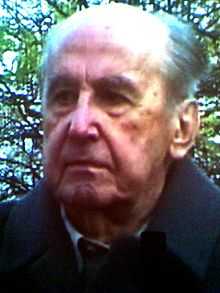Jacek Karpiński
| Jacek Karpiński | |
|---|---|
 | |
| Born |
April 9, 1927 Turin, Italy |
| Died |
February 21, 2010 (aged 82) Wrocław, Poland |
| Occupation | electronics, cybernetics & programming engineer |
| Awards |
|


Jacek Karpiński (9 April 1927 – 21 February 2010) was a Polish pioneer in computer engineering and computer science.
During WW2 he was a soldier of Batalion Zośka of Polish Home Army, awarded multiple times with a Cross of Valour. Among the others he took a part in Operation Kutschera (intelligence) and Warsaw Uprising when he was heavily wounded.
Later he became a developer of one of the first machine learning algorithms, techniques for character and image recognition.
After receiving a UNESCO award in 1960, he studied for 2 years at Massachusetts Institute of Technology and Harvard University.
In 1971 he designed one of the first minicomputers, the K-202. Because of the policy on computer development in the People's Republic of Poland, belonging to the Comecon that time, K-202 was never mass-produced. Karpiński later became a pig farmer, and in 1981, after receiving a passport, emigrated to Switzerland.
He also founded the Laboratory for Artificial Intelligence of the Polish Academy of Sciences in the early 1960s.
AAH
The AAH was a vacuum tube computer built in 1957 for a weather forecasting.
AKAT-1
The AKAT-1 was the world's first transistor differential analyzer, constructed by Jacek Karpiński at the Polish Academy of Science's Institute of Automatics in 1959. It was designed to solve systems of differential equations and modeling processes.
KAR-65
The KAR-65 (1968) was a transistor-based computer designed for analyzing particle collision data from CERN.
K-202
Built in 1971, the K-202 was one of the first minicomputers. Having 16-bit word, up to 8MB addressable memory range, modular architecture and priced at around $3000, it was one of the best of its times.
See also
References
External links
- TVP "Co się stało z polskim Billem Gatesem?" (video, Polish)
- "Polski Bill Gates i świnie" – Gazeta Wyborcza (Polish)
- onet.pl "Zniszczyć konstruktora" (Polish)
- "Genialny wynalazca" onet.pl (Polish)
- Zmarł genialny konstruktor Jacek Karpiński kopalniawiedzy.pl (Polish)